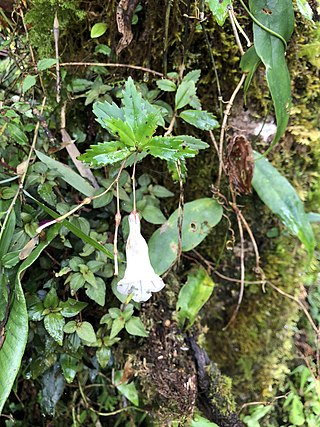Hu Zhen, courtesy name Wencai, was a military officer serving under the warlord Dong Zhuo during the late Eastern Han dynasty of China. He was described as an influential man from Liang Province (涼州).

Tree peony is the vernacular name for the section Moutan of the plant genus Paeonia, or one of the species or cultivars belonging to this section. It consists of shrubs that have perennial aerial woody stems. Other peonies do not have perennial woody stems, but their stems die back after the growing season, to emerge again from buds just below the surface early in the following year. Tree peonies have been in culture in China for millennia, and it is likely that hybrids came into being in gardens, where different wild tree peony species were planted closely together. They are used in China both for medicine and as an ornamental, particularly the hybrids called Paeonia suffruticosa. These hybrids in particular, but other tree peonies too, are called mǔdān (牡丹) in China.
Briggsia was a genus in the family Gesneriacae that consisted of 22 species of herbaceous perennials, native to the Himalayas, China and Vietnam. The genus is no longer recognized, with all of its member species having been relocated to other genera, including Glabrella, Loxostigma, and Oreocharis.

State of Divinity is a Taiwanese television series adapted from Louis Cha's novel The Smiling, Proud Wanderer. It was first broadcast on CTV in Taiwan in 2000.

All Men Are Brothers is a 2011 Chinese television series adapted from Shi Nai'an's 14th century novel Water Margin, one of the Four Great Classical Novels of Chinese literature. The series is directed by Kuk Kwok-leung and features cast members from mainland China, Taiwan and Hong Kong. The series was first broadcast on 8TV in March 2011 in Malaysia.

Buddleja forrestii is a deciduous shrub or small tree widely distributed from India to western China. First described by Diels in 1912, he named the species for plant hunter George Forrest, who discovered the plant in Yunnan in 1904 and introduced it to Western cultivation.

Clematis napaulensis, the Nepal clematis, is a species of flowering plant in the buttercup family Ranunculaceae. It is native to China and the Indian subcontinent, including Nepal, whence the specific epithet napaulensis.

High Flying Songs of Tang Dynasty, also known as Da Tang Ge Fei, is a Chinese television series based on the romance between the Tang dynasty singer-dancer Xu Hezi (许合子) and her lover Yin Menghe (尹梦荷), as well as a fictitious account of their involvement in the events in the reign of Emperor Xuanzong. Starring Ma Su and Jia Nailiang as the couple, the series was first aired on CCTV-8 in mainland China on 20 September 2003.

Amazing Detective Di Renjie 2, also known as Shen Tan Di Renjie 2, is the second installment in a four-season Chinese television series based on gong'an detective stories related to Di Renjie, a Tang dynasty magistrate and statesman. Written and directed by Qian Yanqiu, the series starred Liang Guanhua as the titular protagonist, and was first broadcast on CCTV-8 on 20 November 2006, two years after the first season. It was followed by Amazing Detective Di Renjie 3 in 2008, and Mad Detective Di Renjie in 2010. The series was released in the United States on March 21, 2018 on Toku.
Dr. Sun Yat-sen is a 1986 Chinese drama film directed by Ding Yinnan. The film was selected as the Chinese entry for the Best Foreign Language Film at the 59th Academy Awards, but was not accepted as a nominee.

Be With You is a 2015 Taiwanese romance, family drama television series produced by Sanlih E-Television, starring Bobby Dou, Huang Pei Jia, Nylon Chen, and Vivi Lee as the main cast. The Chinese title literally translates to "Want To Love". Filming began on March 18, 2015 and will be filmed as it airs. First original broadcast began April 14, 2015 on SETTV channel airing weekly from Monday till Friday at 8:00-9:00 pm.

Love Cuisine is a 2015 Taiwanese romance, comedy drama television series produced by Sanlih E-Television, starring Lego Lee, Allison Lin, Duncan Chow and Nita Lei as the main cast. Filming began on July 13, 2015 and will be filmed as it airs. First original broadcast began August 7, 2015 on SETTV channel airing every Friday nights at 10:00-11:30 pm.

Petrocosmea kerrii is a species of flowering plant in the family Gesneriaceae, sometimes cultivated as a houseplant. In the past, it has been erroneously placed in the genus Damrongia. It was first described by William Grant Craib in 1918.
The China Badminton Super League (CBSL) (Chinese: 中国羽毛球俱乐部超级联赛) is the prime National team competition for badminton players in China. The China Badminton Super League was re-launched in 2009 after a failing attempt seven years earlier. Liu Fengyan, director of the Table Tennis and Badminton Administration Center under China's State General Administration of Sport, announced the re-launch during the 50th anniversary meeting of the Chinese Badminton Association.

The Counsellors' Officeof the State Council is an advisory agency directly under the State Council of People's Republic of China. The Central Institute of Culture and History is a research institute led by the same leadership and located in the same building. They are regarded as the official government think tanks.

Lysionotus is a genus of flowering plants in the family Gesneriaceae. It occurs in the Himalayas, China, Japan, and Southeast Asia. The genus was described by David Don in 1822.
The China men's national artistic gymnastics team represents China in FIG international competitions.












